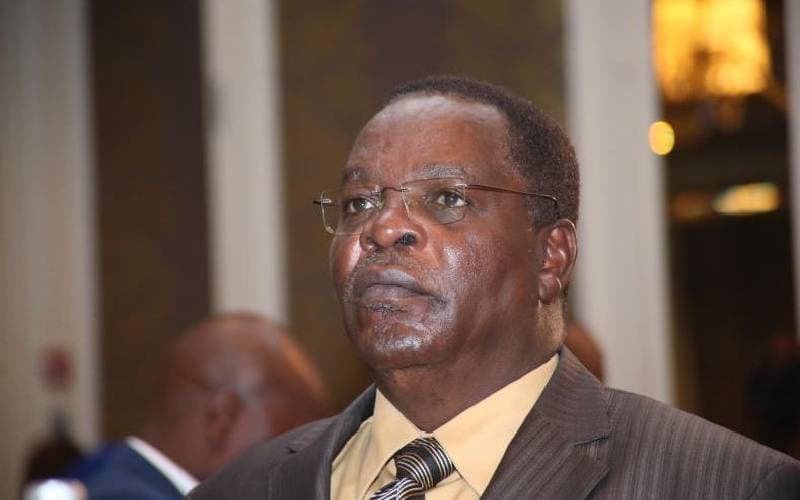We're loading the full news article for you. This includes the article content, images, author information, and related articles.
The Anti-Corruption Court has mandated a 14-day consultation between the Director of Public Prosecutions and the Ethics and Anti-Corruption Commission after the agencies clashed over a proposed plea deal to drop the former Migori governor's long-running corruption case.

NAIROBI, KENYA – The High Court’s Anti-Corruption Division on Friday, October 24, 2025, issued fresh directives in the long-running Ksh505 million corruption case against former Migori Governor Zakaria Okoth Obado, ordering the country's top prosecutor to resolve conflicting positions with the anti-graft agency over a proposed plea bargain. The court has given the Director of Public Prosecutions (DPP), Renson Igonga, and the Ethics and Anti-Corruption Commission (EACC) a 14-day window to consult and harmonise their stances.
The directive was issued after a stalemate threatened to derail the trial, which has been ongoing for over four years. On September 1, 2025, the DPP’s office informed the court of its intention to withdraw the charges against Mr. Obado and his co-accused, citing a plea bargain agreement had been reached. However, the EACC, the primary investigating body in the case, swiftly contested this move, informing the court that it had not signed off on any such deal. This public disagreement between two critical state agencies prompted the court to intervene, ordering them to confer and present a unified position. The case is scheduled for a mention on Friday, November 7, 2025, to review the outcome of these consultations.
Mr. Obado was first arrested and charged in August 2020 alongside several co-accused, including four of his children: Dan Achola, Scarlet Susan, Jerry Zachary, and Evelyne Adhiambo. The prosecution alleges that between 2013 and 2017, they conspired to defraud the Migori County Government of hundreds of millions of shillings through a complex scheme of irregular procurement and fictitious contracts. The charges leveled against them include conspiracy to commit an economic crime, money laundering, and unlawful acquisition of public property. Investigations by the EACC initially flagged suspicious payments totaling over Ksh1.9 billion made to companies allegedly linked to the former governor and his associates.
The controversy surrounding the Ksh505 million case is complicated by a separate, successful plea agreement involving Mr. Obado that was concluded just last month. On September 5, 2025, the ODPP announced it had finalized a deal in a case where Mr. Obado and 17 co-accused were charged with the misappropriation of Ksh73.4 million. Under that agreement, which was initiated at the request of the accused through an Alternative Dispute Resolution (ADR) mechanism, the defendants agreed to forfeit assets valued at Ksh235.6 million—more than three times the amount allegedly stolen. The surrendered assets included a house in Loresho, Nairobi, valued at Ksh40 million, commercial and residential blocks in Suna East, apartments in Nairobi's Greenspan Estate, and two Toyota Land Cruiser vehicles.
The successful conclusion of the Ksh73.4 million case through a plea bargain may have set a precedent for the larger, more complex Ksh505 million case. However, the EACC's objection to the latest proposed deal indicates significant unresolved issues. While the ODPP has the constitutional mandate to prosecute and enter into plea agreements, the investigating agency's input is procedurally crucial, particularly in complex economic crime cases.
The standoff between the DPP and the EACC puts a spotlight on the application and integrity of plea bargains in Kenya's fight against high-profile corruption. Proponents argue that such agreements can lead to the swift recovery of stolen public assets without resorting to lengthy and costly trials, which can take years to conclude. The Ksh235 million asset recovery is a case in point. However, critics express concern that these deals may allow powerful individuals to evade accountability and the full force of the law, potentially undermining public trust in the justice system. The court's directive for the two agencies to consult underscores the need for a collaborative and transparent approach. The outcome of their discussions will be a critical determinant in the direction of this high-stakes case and could influence how similar corruption cases are handled in the future.
Keep the conversation in one place—threads here stay linked to the story and in the forums.
Sign in to start a discussion
Start a conversation about this story and keep it linked here.
Other hot threads
E-sports and Gaming Community in Kenya
Active 9 months ago
The Role of Technology in Modern Agriculture (AgriTech)
Active 9 months ago
Popular Recreational Activities Across Counties
Active 9 months ago
Investing in Youth Sports Development Programs
Active 9 months ago